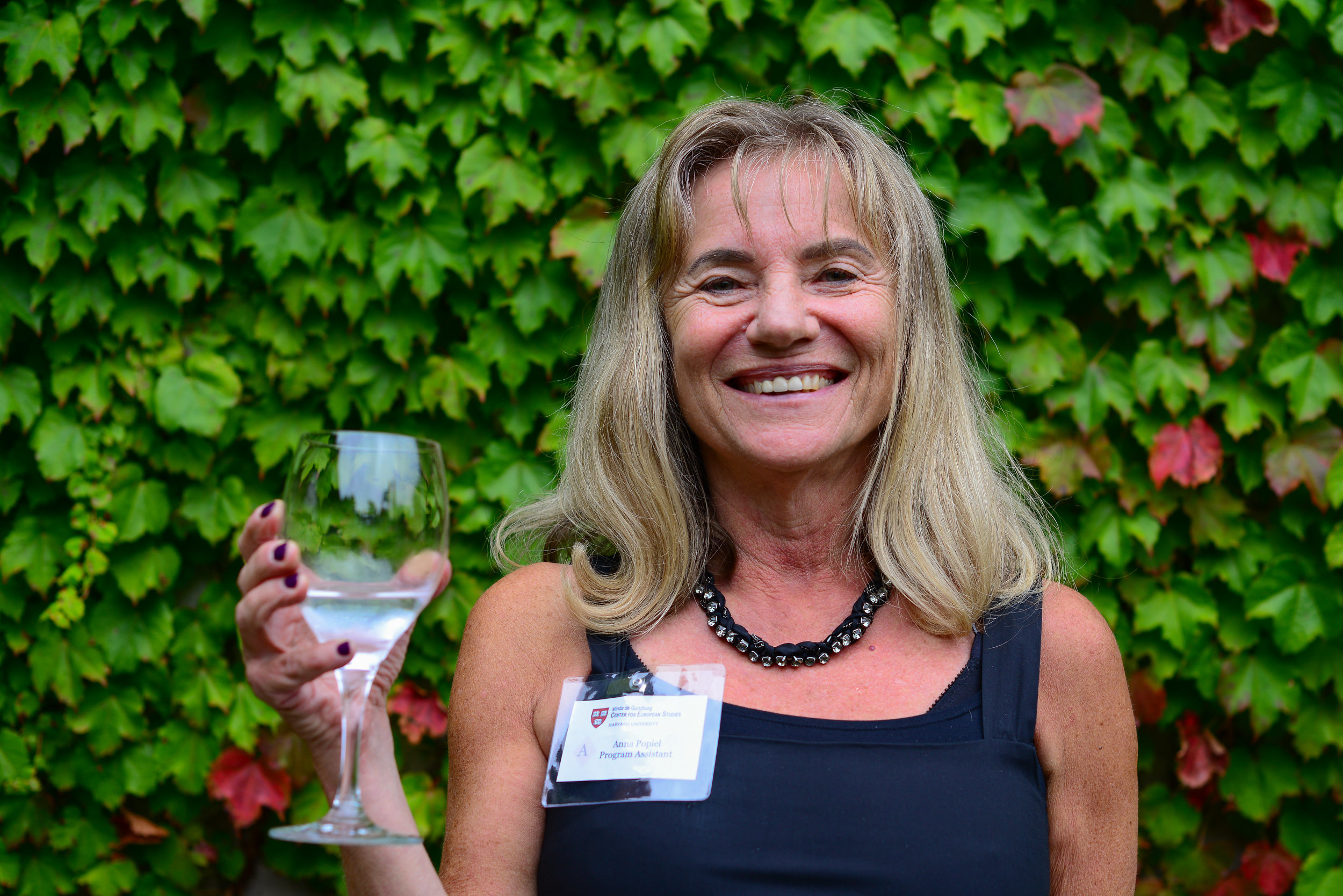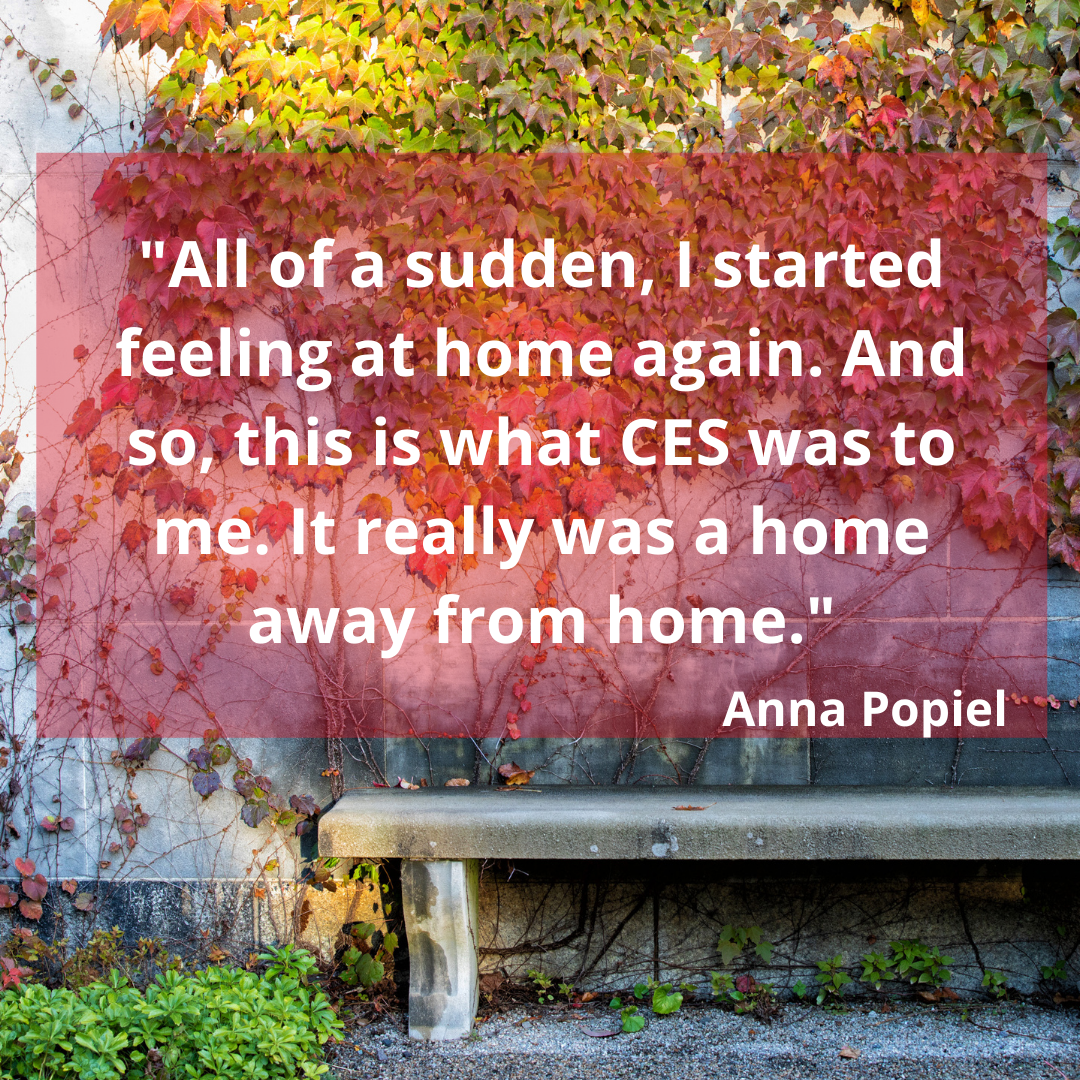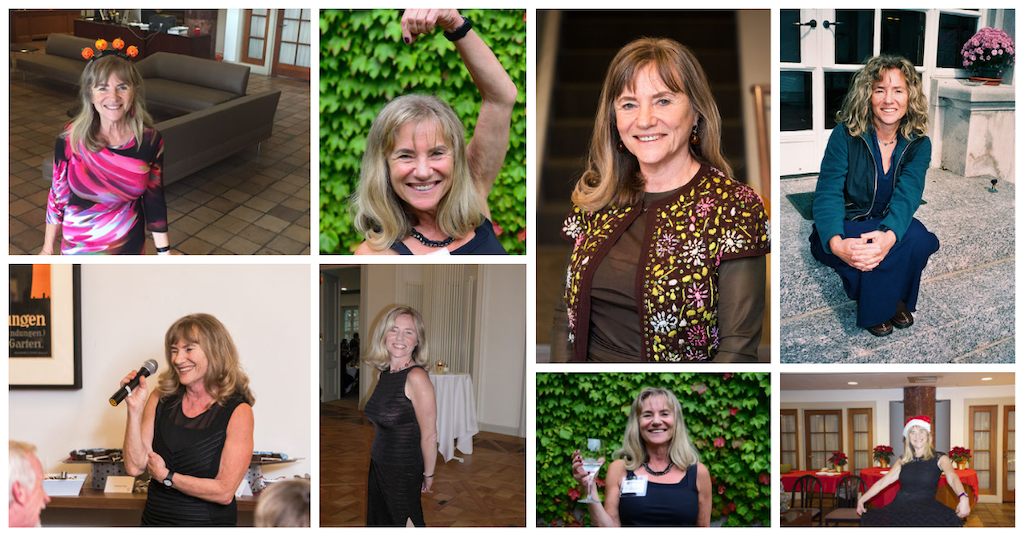After 36 years at CES, Anna Popiel is retiring. Starting at Bryant Street with cramped working conditions and a typewriter, Anna has seen the Center grow and change. For many, she has become the heart of Adolphus Busch Hall, and in many ways, she represents ‘where Harvard and Europe meet.’
** To leave a wish for Anna, please click here. **
CES: Take us back to your life before you came to America, why did you decide to leave Poland?
 Anna Popiel: I came to the U.S. in 1981. This was a year when a lot of important political changes were going on in Poland, which is what prompted my coming. My husband was already here doing a Ph.D. I came with the children to join him, [and] after martial law was declared, we decided not to go back. We applied for political asylum and got it.
Anna Popiel: I came to the U.S. in 1981. This was a year when a lot of important political changes were going on in Poland, which is what prompted my coming. My husband was already here doing a Ph.D. I came with the children to join him, [and] after martial law was declared, we decided not to go back. We applied for political asylum and got it.
This is how I found myself here. I didn't have a very extended professional career, but what I did for most of my working career was interpret, translate and teach, both English and Polish. I taught Polish at, of all places, the American Embassy in Poland, which made my transition to America easier.
CES: You often speak about your days in the Youth Movement. What is this, and how did it influence you?
Anna Popiel: Yes, the Youth Movement. I participated in it for quite an extensive time during my youth, and I think it shaped me in certain ways. It's difficult to explain. We were politically engaged and inclined, it was very ideological. There was a big social and sociological component. In other words, it was a big team experience, a team effort. We were all part of a group, and this was extremely important to me. We had, for example, an oath, which we took, and I’ve tried for a long time, even beyond my youth, to stay faithful to this oath.
Part of it was, for example, not smoking or drinking. To this day, I almost never drink, and people always ask me why. They assume I am a recovering alcoholic. I am not. It really goes back to my Youth Movement days. The main component was to be faithful to communist ideals. But the good communist ideals: friendship, taking care of weaker people, etc.
In many ways that’s why I was drawn to the CES community. And through my years here, I tried to introduce some of my values.
CES: How did you find CES?
Anna Popiel: When I came to the U.S., I was at a loss professionally. As I said, I worked for the American embassy in Poland. I found myself in the embassy quite by chance. I made friends with an American living in Warsaw, and he recommended me. I started working there and I stayed on. I have a tendency to stay on in jobs for a long time.
Then, when I came to the States, my original plan was to continue teaching Polish to diplomats at the Foreign Service Institute [at the United States Department of State], but my husband got a job here at MIT. And so, I found myself without a job and without a clear idea of what to do next.
I started teaching at the Slavic department at Harvard, because a professor [Stanislaw Baranczak] in the Slavic department was a friend. I was teaching Polish as a lecturer, but that wasn't a full-time job.
Then, the current receptionist at CES, who was one of my students, was graduating. She said, ‘This is a very nice place. I think you can get that job. I’ll introduce you, and if you like it, you can have it.’ So that's what we did. I did an interview with Abby [Collins], who was, at the time, the Executive Director.
Abby had a tendency to hire interesting people. Interesting was a big part of the job description, and I guess that's what she found in me. This is how I found myself working at CES.
CES: What were those early days like at Bryant Street?
Anna Popiel: I could tell you a million very funny stories about working the phones because of my accent. The phones rang nonstop because people had extensions, but you couldn't dial somebody’s extension. You had to go through me. So, all phone calls in the whole building went through me, and my phrase “Center for European Studies” became famous. My accent was made fun of in a million different ways. Those were fun times.

Then we moved to Kirkland Street and things changed overnight. This was another learning curve and big change in my life – a new building and computers were becoming more common. We grew in terms of people, our visiting scholars, the staff – roles changed. We became more events based.
It became bigger, more elaborate, richer, different in appearance, palace-like. I was on maternity leave for a while, so I missed the move [in 1989]. When I came in September, I came to a new CES. I was completely taken aback. My desk was big and at the center of this beautiful hall. We had a cook all of a sudden. It felt a little like going to Buckingham Palace.
CES: What did you struggle with, in those early days at CES?
Anna Popiel: At the beginning, getting the job and trying to do a good job was very challenging for me. I’d never worked in an office before; I’d never worked in the United States either.
I had to learn, among other things, how to be professional. I didn't quite know what that meant and what was expected of me. I was different. My mannerisms, my body language, were all imported from a different country, from a different culture. They didn't always fit. I needed to learn that. Here I need to stress my gratitude to Abby who really had faith in me and gave me the time to learn and adjust.
CES: Do you have any examples of things you had to learn?
Anna Popiel: In my culture in Poland, smiling is a very different thing than in America. You basically smile when there's something funny going on, otherwise you do not smile or else it is read in a different way. I didn't smile, and I was told that I needed to do that. So, I started smiling nonstop. I was self-conscious about it. I had this glued-on smile. Today, after 40 years of living in America, when I go back to Poland my hairdresser says, ‘Oh, here is this woman who comes with this American smile of hers.’
Another example was my strong accent. I know that it’s a part of my personality, and people were mostly nice and gracious about it. But sometimes it would bother me, and I would become self-conscious. I would try to get rid of certain things like my Rs, but all that wouldn't work.
It was a big learning curve, and I've learned a lot. I kept learning until the last day on the job. It really was a journey. In the end, coming to CES and being at CES was extremely important to me. I was very lucky to get this job.
CES: Is there a person at the Center or a particular thing about CES that you are particularly thankful for?
Anna Popiel: Again, my gratefulness to Abby is endless because it really meant a lot. Maybe not as much professionally as psychologically. I was pretty lost, on many levels, after I emigrated. It turned out to be more difficult than I ever imagined. The fact that I could be at a place full of Europeans and Europe-minded people, meant the world to me and helped with the whole immigration experience.
Also, to go back to my Youth Movement days, I was more about the team. I found a different community, but a community similar in certain ways to the one I’d left. I made a lot of friends quickly. I didn’t feel out of place anymore, because I belonged somewhere. I had friends with whom I could exchange ideas and have a conversation. All of a sudden, I started feeling at home again. And so, this is what CES was to me. It really was a home away from home. I think that is priceless for somebody in my position. I really needed it.
In return, I tried to give the best I could, and I tried to become the kind of employee that people expected me to be. I was lucky that CES, at the time, was much smaller. If I came to a much larger institution, it would have been more difficult, but starting small and growing with CES, was also another lucky element. I think that luck played a big role here.
 CES: What does CES mean to you? What did you cherish the most?
CES: What does CES mean to you? What did you cherish the most?
Anna Popiel: I have to say that during all these years at CES, I kept learning, learning from all perspectives. I was incredibly lucky to interact with the smartest people around, and I've learned tons from them, from daily conversations, from having coffees in the kitchen, from conferences. Someone from the community once said to me, ‘you must be so wise because you're going to all these conferences.’ And I thought to myself, in a strange way, he's right. I mean, not that I am so wise, but I did learn a whole lot, from going to the conferences, the seminars, from listening, from starting to read things I haven't read before. I tried to read everybody's books, and I wouldn't have, if I didn't work at Harvard, at CES.
I kept learning all the time. And when people asked me, isn't it boring? Why have you never thought of switching jobs? I thought to myself, I still have a lot to learn here, and it's not boring at all. Boring is the last word I would ever use. It's interesting in a thousand ways.
There were so many great things about this job that I really loved, and I loved it till the very last moment. I am very attached to CES and the community. I’m very grateful for friendships, for people's attitudes towards me, for people's patience with me.
CES: Do you have any memories of the Center that you thought were quintessentially CES?
Anna Popiel: Perhaps people who visited. The high-level people who came through the door, and I had a chance to interact with, that was super interesting. To see Lech Wałęsa, that whole visit was humorous in many ways, wonderful and important. When Angela Merkel came that was a moving moment. And my personal friendships and conversations with people, some of which are very memorable. Contact every day with this community was very pleasant.
I really cherished some conferences, in particular those relating to Poland. A few events I helped organize were also very rewarding. Some of my old friends have found themselves at CES, because I helped them come.
CES: What was your favorite Friday lunch menu?
Anna Popiel: Friday lunch is a whole different chapter of my career. I grew along with the CES lunch. It was such a different thing when it started on Bryant Street. Then we kept somebody who cooked, but the lunch was way smaller. When we moved to Kirkland Street, we started catering lunches.
When I was organizing lunches, ordering food and collecting money, people who came from outside CES seemed to always think I was responsible for what was being served. I heard endless comments that the chicken was too dry, or the fish was not to their liking, and the meatloaf was like somebody had in the army. I tried to explain to people that I didn't cook it.
Selecting the menu was challenging because it always had to have variety, but we could really only serve chicken or fish. Many foods became politically incorrect throughout my CES career. I mean, you couldn't serve pork or beef anymore. This was a big learning curve for me. When all this started with vegetarianism and veganism, I was a little bit at a loss and sometimes irritated. But you’ve got to be diplomatic.
But my favorite menu though, I think I'll go with the salmon. This is pretty much everybody's favorite.
CES: You have fabulous style. Who inspired you and how did you develop your unique Anna style?
Anna Popiel: This is so funny. I will send this interview to my friend Ludka. I think everybody on the staff knows about her. She has a fabulous sense of style and is a very generous person.
When I first started working at CES, I didn't know how to dress for work. I needed guidance in this department. I was coming from somewhere where you didn't have a choice. I didn't have a very well-developed style or know what was correct.
I would wear a dress, which was appropriate for the beach, to work. I thought I looked great. Then somebody would say, ‘no, no, you can't wear that.’ So, I turned to my friend Ludka. I remember talking to her on the phone and saying, ‘listen, I have tremendous difficulties in the clothing department for work. I don't dress properly. Could you help me?’ She started giving me advice and sending me packages for Christmas and birthdays. So around twice a year, I would get a package of clothing from her. I was literally wearing what she was sending me. This is how my style started developing. I saw what she was sending me and figured out how to put it together. Then I started doing it myself, but it really was a challenge. I just wrote her about my retirement saying that I owed her part of my retirement because she's been dressing me for years.
CES: What are your plans now? What is the first thing you're going to do after retirement? Are there any things that people might not know about you?
Anna Popiel: People pretty much know everything about me.
I don't have huge plans. I think when a vaccine comes and travel is possible, I would like to travel and perhaps live someplace else, perhaps live part time in Poland again. Mostly, I'm looking forward to having time on my hands and just being able to travel.
I may also write my infamous CES book, of course. People should start sending me money now to not be mentioned. No, I’m joking about that.
I will enjoy having time for exercising, dancing, traveling and just living. I also want to keep up with CES and the events. I'll probably come to a bunch of events and be lingering around at CES. You'll never get rid of me.
